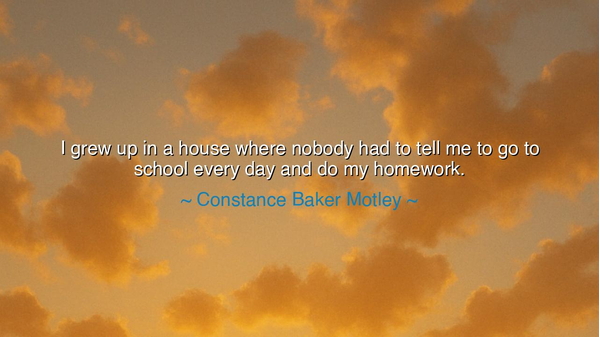
I grew up in a house where nobody had to tell me to go to school
I grew up in a house where nobody had to tell me to go to school every day and do my homework.






Hearken, O seekers of wisdom, and attend to the words of Constance Baker Motley, who speaks with the authority of experience: “I grew up in a house where nobody had to tell me to go to school every day and do my homework.” In these simple words lies a profound truth about discipline, responsibility, and the shaping of character. Motley reveals that the foundations of greatness are often laid in the quiet architecture of a home, where values are absorbed, not merely instructed, and where self-motivation is cultivated naturally.
The notion of internalized duty flows like a river through these words. Motley did not require external prodding because the culture of learning and diligence was embedded within her household. This represents an ancient wisdom: that the environment, the ethos of the home, and the moral architecture in which a child is raised can instill habits and values that endure a lifetime. Education becomes not a task, but a calling, and discipline is understood as freedom, not confinement.
Consider the upbringing of Benjamin Franklin, who, though born in humble circumstances, grew in a household where the pursuit of knowledge and personal improvement was expected and embraced. Franklin absorbed a culture of reading, writing, and reflection that did not require constant admonition. Motley’s words echo this timeless pattern: responsibility and diligence flourish most when nurtured from within, guided by the principles of the home rather than merely enforced by authority.
The phrase “nobody had to tell me” emphasizes the significance of autonomy and self-direction. True growth, Motley implies, arises when one internalizes purpose and cultivates personal commitment. The child who is guided without coercion learns the value of initiative, understanding that progress depends upon self-discipline and the conscious choice to act. This is a wisdom extolled by the ancients: that virtue is strongest when it emerges voluntarily, not under compulsion.
Historically, the example of Marcus Aurelius comes to mind. Though a prince and heir to Rome, he was taught to embrace learning, duty, and reflection with self-directed dedication. He understood the importance of cultivating discipline and personal responsibility early, so that the weight of empire would not crush the soul, but instead refine judgment and moral strength. Motley’s reflection aligns with this principle: the early cultivation of responsibility equips one to meet the challenges of life with courage and clarity.
The lesson of these words is both practical and profound: the habits instilled in youth shape character and determine the capacity for achievement. Motley’s experience illustrates that self-motivation, once nurtured, becomes a powerful ally in the pursuit of knowledge, justice, and purpose. It reminds all generations that the home is the first classroom of life, and that values absorbed in quiet moments resonate far longer than commands or admonitions.
Practically, one may honor this wisdom by cultivating environments that foster curiosity, responsibility, and reflection. Encourage children and young adults to take ownership of learning, provide guidance without coercion, and model the virtues of diligence, curiosity, and self-discipline. In doing so, one creates a fertile ground for autonomous growth, where education becomes both a privilege and a joy rather than a burden.
Thus, let the words of Constance Baker Motley echo through time: greatness is nurtured in the quiet expectation of the home, in the habit of responsibility internalized, and in the joy of learning embraced without command. By fostering environments of trust, guidance, and moral clarity, we cultivate souls capable of self-direction, wisdom, and enduring achievement, ensuring that the legacy of discipline and purpose passes from one generation to the next.






AAdministratorAdministrator
Welcome, honored guests. Please leave a comment, we will respond soon